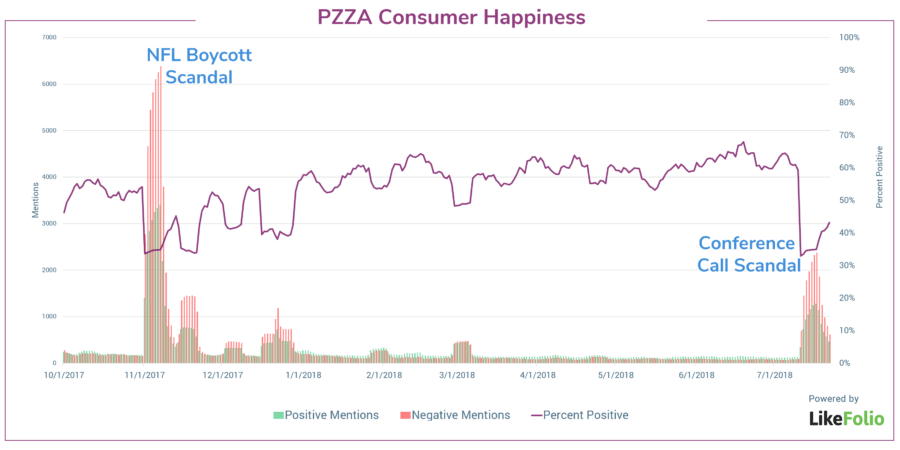The news cycle runs 24/7, which means CEO reputation is constantly under the microscope. One wrong statement can cause a viral chain reaction of negative press that reverberates through your company, damages corporate reputation and severely impacts revenue. Therefore, CEO reputation management isn’t a luxury; it’s a necessity.
Companies cannot afford to underestimate the impact the reputation of their executive leadership has on their brands.
A commissioned study of 266 global executives, Forrester Consulting
A CEO’s reputation affects nearly every aspect of a business. Let’s look at some of the biggest reputational risks caused by an unfavorable CEO reputation.
Financial impact of a negative CEO reputation
Chief executive reputations range from squeaky-clean Tim Cook, to mavericks like Elon Musk, and kings of controversy like former Uber CEO Travis Kalanick. Unfortunately, the more radical C-suite business leaders are, the harder it is to manage risk.
A positive online reputation is vital to securing investors and building strategic partnerships. Conversely, if a brand’s chief executive officer is a loose cannon, those critical relationships can crumble. As a result, corporate reputation will take a nosedive and drag down market capitalization.
For example, look at what happened to Papa John’s in 2018. Their brand reputation took a massive hit from two scandals caused by the founder and CEO. As a result, the stock plummeted 13% during a period when their competitor, Dominos, was up 48%. Just one comment by their CEO erased $96.2 million in market value in a few hours of stock trading.
Take a look at this chart by LikeFolio which illustrates the flood of negative brand mentions after each event.

A survey done by Weber Shandwick estimated that 44% of a company’s market value is attributable to CEO reputation. Furthermore, another survey found that 95% of financial and industry analysts said they would purchase stock based upon a CEO’s reputation. And 94% said they would recommend the stock to others based on the CEO’s reputation. As you can see, CEO reputation is responsible for a massive amount of shareholder value.
CEO reputation affects employees
We live in a world where everything is just one Google search away. As a result prospective employees are heavily influenced by what they discover online. That’s especially true of negative Glassdoor reviews or unfavorable posts on social media platforms like LinkedIn.
Furthermore, a positive CEO reputation fosters brand trust, which helps retain loyal employees. That, in turn, drives down the cost of constantly training new hires.
Glassdoor recently compiled a list of the Top 10 CEOs. What’s interesting is that they share many common traits. For instance, they…
- Foster a culture of transparency and accountability among themselves and employees at every level.
- Are dedicated to solving the day-to-day issues facing leadership .
- Present a strong, real-world and online presence for their business.
A CEO’s online reputation is crucial in forming the workforce that drives successful Fortune 500 companies.
CEOs influence corporate reputation and media coverage
According to a 2020 commissioned study by Forrester Consulting, nearly three-quarters (74%) of respondents believe their customers moderately to considerably tie their perception of a brand to their perception of its executives.
So, company reputation and CEO reputation are intimately connected in the eyes of customers. Which means, when business leaders get negative media exposure, the press ties this story to the company’s reputation, fueling the need for additional corporate reputation management.
Ultimately, it’s much more difficult to sell products and services when the CEO fails to foster public trust.
Your career and legacy
2019 saw the most CEO departures on record. And some notable figures were let go for a single reputation-damaging event. In December of that year alone, a shocking 160 CEOs left their posts. As one example, the founder of the luggage company Away left after reports that she fostered a toxic work environment.
These departures cost corporations hundreds of millions of dollars in compensation packages. Moreover, a negative reputation hurts your marketability as a top performing business leader.
CEOs as brand ambassadors
In the past, it was much simpler to be the CEO of a large company. Long before the days of Yelp, Facebook, Twitter, LinkedIn, and the 24-hour news cycle, CEOs were mostly concerned with quietly running the business and keeping investors informed and satisfied.
Today’s CEOs are jacks and jills of all trades. Not only are they running the company from the top, but are also expected to be more public-facing and available (and accountable) to staff, stakeholders, and customers alike. CEOs are also expected to perform crisis management with tact and extreme sensitivity. And they must possess ever-evolving thought leadership skills and ingenuity. Today, a CEO’s toolbox has to be bigger than ever before.
Proven CEO reputation management tactics
CEO reputation management protects your business, your legacy and your personal brand. A comprehensive ORM strategy can remove unwanted search results from Google while establishing a more well-rounded and accurate online presence.
The following tactics provide a general overview of how ORM works. For a more complete breakdown of pricing as well as a comparison between us and some competitors, read our article about reputation management cost.
1. Map your online narrative
The first step of executive reputation management is to Google your name and map out your complete search landscape. Taking the pulse of your online presence means looking far beyond the first page of Google. In fact, we perform sentiment analysis against the first 500 search results for our customers. Although it’s an arduous process, it’s necessary to understand how Google perceives you.
2. Identify risks and opportunities
Once you have a better sense of what your Google search results look like, you’ll want to assess your reputation risk. Many CEOs are familiar with enterprise risk management which aims to minimize the cost of strategic risk. However, reputational risk management is far more nebulous. It attempts to measure the fiscal impact of viral news cycles and negative news articles on a brand.
You’ll need to do more than identify potential risks. You’ll also need a keen eye for opportunity. It’s not enough to own just one static web property. You need to control as many domains as possible to manage your online reputation. So, bulk out your social media profiles, online platforms, and other public-facing digital assets. You should also take inventory of your allies and build your network.
3. Optimize existing preferred content
In order to really own your search landscape, you’ll need to optimize your existing content to target the correct keyword groups. Then, you’ll need to earn plenty of backlinks to make sure your customers and shareholders discover the positive content that tells your story.
This is perhaps the most time-consuming part of CEO reputation management.
4. Strategically create new content
Once you’ve optimized your existing content, you’ll need to build up your web assets through content like keyword-focused blogs, frequent and engaging posts on social media accounts, and captivating press releases. Since relevant, timely, high-quality content about executives has the best chance of ranking well in the SERPs, many of our customers extend their contracts with us for years after we resolve their initial issue to future-proof their reputation.
5. Coordinate PR and CEO reputation management
An important part of a CEO reputation management plan includes coordinating messaging with your company’s public relation (PR) firm. This allows you to promote the good things that you and your company are doing to improve the world through timely press releases. As a result, you’ll boost your personal image as well as your brand’s reputation.
6. Bury unfavorable search results and articles
It’s highly unlikely that Google will remove news articles about a CEO, especially if that content is featured by a major publisher or syndicate. So, the best course of action is to bury negative Google search results by understanding what SEO is and how it works.
A study conducted by Moz found that merely 7 percent of those surveyed said they browse past the first page of search results. That means the vast majority of searchers wouldn’t even see your content if it was pushed off the front page. Burying unfavorable content in the SERPs allows you to craft the narrative you want others to see. And executives agree this strategy is important to business success.
Consider these reputation management statistics from a new commissioned study by Forrester Consulting. Nearly 70% of executives associate SEO strategy with improved brand perception. Additionally, 54% of executives believe reducing unfavorable search results would drive revenue growth. Read the full study here.
CEO reputation management takes time – start now
Online reputation repair isn’t something to take lightly if you’re a fortune 500 executive. Don’t expect firms that work with small businesses and local companies to be able to fix search results that contain articles from top-tier news organizations.
We have a proven track record and case studies to back up our results. Contact us to discuss your solution.
FAQs about CEO reputation
While it’s not possible to build complete immunity against a viral news cycle, ORM reduces the impact and timeline to reputation recovery.
The only way to remove information from Google is if it includes sensitive information that could pose a risk to your physical or financial well-being. Otherwise, the best way to correct your brand narrative is to suppress negative results through ORM.
We helped a Fortune 500 CEO correct an inaccurate and unbalanced search landscape that was focused around a single negative event despite their many positive lifetime accomplishments. View the case study.
Each scenario brings unique challenges, but in general it takes about twelve months to build a positive reputation on the first page of Google, with noticeable results after a few months. Although some services advertise faster results, they often deploy short-term tactics that don’t have a lasting impact. Get a custom quote.
Reputation Management Resources

10 Questions to Ask Your ORM Firm
Spot a high-risk ORM firm with these simple questions.

How to Push Down Negative Search Results
Find out how to bury negative search results in Google

Reputation Management Pricing Guide
Find out how reputation management pricing works.

